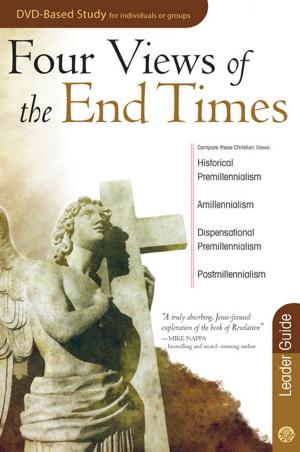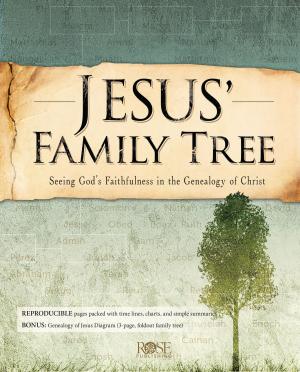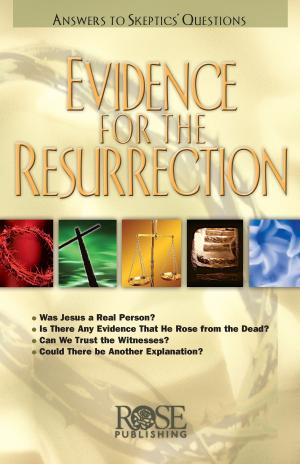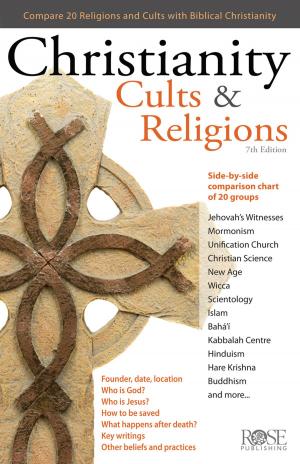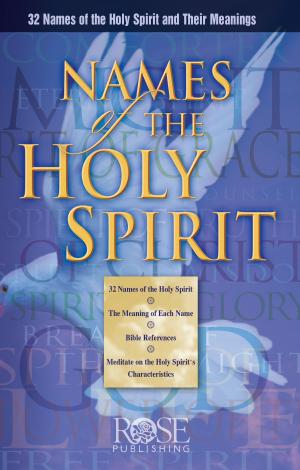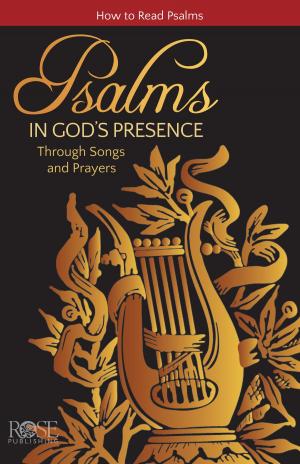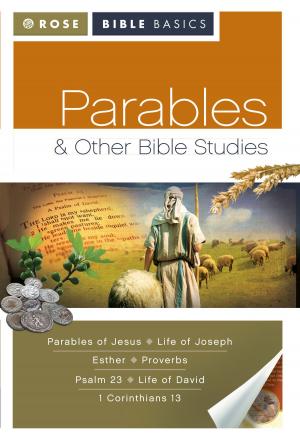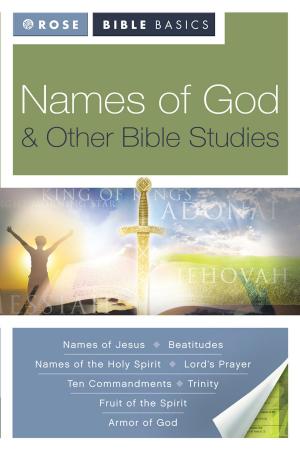| Author: | Benjamin Galan | ISBN: | 9781628620986 |
| Publisher: | Rose Publishing, Inc. | Publication: | March 25, 2014 |
| Imprint: | Rose Publishing, Inc. | Language: | English |
| Author: | Benjamin Galan |
| ISBN: | 9781628620986 |
| Publisher: | Rose Publishing, Inc. |
| Publication: | March 25, 2014 |
| Imprint: | Rose Publishing, Inc. |
| Language: | English |
Proverbs is one of the most beloved books in the Bible and this full-color 14-panel pamphlet gives you a good overview and includes discussion questions for personal or group use. It explains the types of proverbs and shows the richness hidden below the surface when you understand the their structure and meaning.
What's Included in the Proverbs pamphlet?
• 3 common mistakes when reading the proverbs
• 6 tools for studying the proverbs
• What is a proverb (and what isn't it)?
• How Bible proverbs are different from other proverbs from ancient times.
• Key verses and themes of the proverbs, such as Wisdom, Relationships, Money, Speech, Character, Honor, and Kingship.
• 3 kinds of parallelism in the proverbs and why it's important.
Study Questions for the Proverbs pamphlet
•Read panels 1-2. How is a biblical proverb different from a biblical promise?
•Read panel 3 and pick one of the "Wisdom" proverbs and one of the "Understanding Humanity" proverbs. Look up the verses in your Bible. These proverbs were written nearly 3000 years ago. Give one example of how they are just as important today.
•Read panel 4 on "Description of a Wise Person." Pick one or two verses and look them up. What traits do you appreciate in others? Why is "forgiveness" an important trait for wise people?
•Read panel 5 and pick a proverb on relationships. Women had a much lower status in ancient times than they do today, yet the Bible has a lot to say about treating women with respect. In your opinion, why was this important to the writers of the Proverbs?
•Read panel 6, and pick one of the verses about wisdom and possessions. Look it up and share it. In a society that values wealth and money, what priorities do these Scripture passages encourage. Why?
•Read panel 8, and chose a proverb about kingship. How did Jesus' life show the traits of kingship? As you work with other people at home, school, or the job, which of these traits would you like to model to others?
•Read panels 9-10. How do the proverbs from the Bible differ from the proverbs in other ancient countries? What strikes you as the most important trait in this list and why?
•Read "Proverbs in Context" at the bottom of page 11 and all of page 12. Sometimes the proverbs appear to promise a perfect life for good people. But we know from the life of Job that this is not always true. In the book of James, Christians are told they will have troubles, trials, and difficult times. What mistakes might people make as they read the Proverbs?
•Look at the suggestions on panel 13, and pick a topic or theme to study (see panels 3-6 and 10 for ideas). There are 31 chapters in Proverbs, so it is easy to read one per day and make note of those passages that mention your theme. Keep notes as you read and one month from now, write or discuss what you've learned on this theme.
Main Author:
Benjamin Galán, MTS, ThM, the award-winning author of The Rose Book of Bible Prophecies, was the author of the Rose Guide to the Tabernacle, which won the 2009 Christian Retailers' Choice Award in Bible Reference. He is Adjunct Professor of Hebrew and Old Testament Literature at Fuller Theological Seminary.
Benjamin Galán grew up in a Christian home in Mexico City. During his studies, Galán became enamored with natural sciences. In college, Galen studied physics and mathematics, and grew indifferent and hostile toward the Christian faith. Along with the French mathematician Laplace, Galan believed God was no longer a necessary hypothesis.
After additional studies, Galán began to long for deep, satisfying connections and meaning in his young life. Through the moving testimony of a friend in school, Galán began to read the Bible with renewed eyes, and eventually returned to church. As he became more involved in the ministry of his home church, Galán sensed God's calling.
During his theological studies, Galán fell in love with the Old Testament and understood the Old Testament as the key for understanding the New Testament.
What's Included in the Proverbs pamphlet?
• 3 common mistakes when reading the proverbs
• 6 tools for studying the proverbs
• What is a proverb (and what isn't it)?
• How Bible proverbs are different from other proverbs from ancient times.
• Key verses and themes of the proverbs, such as Wisdom, Relationships, Money, Speech, Character, Honor, and Kingship.
• 3 kinds of parallelism in the proverbs and why it's important.
Study Questions for the Proverbs pamphlet
•Read panels 1-2. How is a biblical proverb different from a biblical promise?
•Read panel 3 and pick one of the "Wisdom" proverbs and one of the "Understanding Humanity" proverbs. Look up the verses in your Bible. These proverbs were written nearly 3000 years ago. Give one example of how they are just as important today.
•Read panel 4 on "Description of a Wise Person." Pick one or two verses and look them up. What traits do you appreciate in others? Why is "forgiveness" an important trait for wise people?
•Read panel 5 and pick a proverb on relationships. Women had a much lower status in ancient times than they do today, yet the Bible has a lot to say about treating women with respect. In your opinion, why was this important to the writers of the Proverbs?
•Read panel 6, and pick one of the verses about wisdom and possessions. Look it up and share it. In a society that values wealth and money, what priorities do these Scripture passages encourage. Why?
•Read panel 8, and chose a proverb about kingship. How did Jesus' life show the traits of kingship? As you work with other people at home, school, or the job, which of these traits would you like to model to others?
•Read panels 9-10. How do the proverbs from the Bible differ from the proverbs in other ancient countries? What strikes you as the most important trait in this list and why?
•Read "Proverbs in Context" at the bottom of page 11 and all of page 12. Sometimes the proverbs appear to promise a perfect life for good people. But we know from the life of Job that this is not always true. In the book of James, Christians are told they will have troubles, trials, and difficult times. What mistakes might people make as they read the Proverbs?
•Look at the suggestions on panel 13, and pick a topic or theme to study (see panels 3-6 and 10 for ideas). There are 31 chapters in Proverbs, so it is easy to read one per day and make note of those passages that mention your theme. Keep notes as you read and one month from now, write or discuss what you've learned on this theme.
Main Author:
Benjamin Galán, MTS, ThM, the award-winning author of The Rose Book of Bible Prophecies, was the author of the Rose Guide to the Tabernacle, which won the 2009 Christian Retailers' Choice Award in Bible Reference. He is Adjunct Professor of Hebrew and Old Testament Literature at Fuller Theological Seminary.
Benjamin Galán grew up in a Christian home in Mexico City. During his studies, Galán became enamored with natural sciences. In college, Galen studied physics and mathematics, and grew indifferent and hostile toward the Christian faith. Along with the French mathematician Laplace, Galan believed God was no longer a necessary hypothesis.
After additional studies, Galán began to long for deep, satisfying connections and meaning in his young life. Through the moving testimony of a friend in school, Galán began to read the Bible with renewed eyes, and eventually returned to church. As he became more involved in the ministry of his home church, Galán sensed God's calling.
During his theological studies, Galán fell in love with the Old Testament and understood the Old Testament as the key for understanding the New Testament.
Proverbs is one of the most beloved books in the Bible and this full-color 14-panel pamphlet gives you a good overview and includes discussion questions for personal or group use. It explains the types of proverbs and shows the richness hidden below the surface when you understand the their structure and meaning.
What's Included in the Proverbs pamphlet?
• 3 common mistakes when reading the proverbs
• 6 tools for studying the proverbs
• What is a proverb (and what isn't it)?
• How Bible proverbs are different from other proverbs from ancient times.
• Key verses and themes of the proverbs, such as Wisdom, Relationships, Money, Speech, Character, Honor, and Kingship.
• 3 kinds of parallelism in the proverbs and why it's important.
Study Questions for the Proverbs pamphlet
•Read panels 1-2. How is a biblical proverb different from a biblical promise?
•Read panel 3 and pick one of the "Wisdom" proverbs and one of the "Understanding Humanity" proverbs. Look up the verses in your Bible. These proverbs were written nearly 3000 years ago. Give one example of how they are just as important today.
•Read panel 4 on "Description of a Wise Person." Pick one or two verses and look them up. What traits do you appreciate in others? Why is "forgiveness" an important trait for wise people?
•Read panel 5 and pick a proverb on relationships. Women had a much lower status in ancient times than they do today, yet the Bible has a lot to say about treating women with respect. In your opinion, why was this important to the writers of the Proverbs?
•Read panel 6, and pick one of the verses about wisdom and possessions. Look it up and share it. In a society that values wealth and money, what priorities do these Scripture passages encourage. Why?
•Read panel 8, and chose a proverb about kingship. How did Jesus' life show the traits of kingship? As you work with other people at home, school, or the job, which of these traits would you like to model to others?
•Read panels 9-10. How do the proverbs from the Bible differ from the proverbs in other ancient countries? What strikes you as the most important trait in this list and why?
•Read "Proverbs in Context" at the bottom of page 11 and all of page 12. Sometimes the proverbs appear to promise a perfect life for good people. But we know from the life of Job that this is not always true. In the book of James, Christians are told they will have troubles, trials, and difficult times. What mistakes might people make as they read the Proverbs?
•Look at the suggestions on panel 13, and pick a topic or theme to study (see panels 3-6 and 10 for ideas). There are 31 chapters in Proverbs, so it is easy to read one per day and make note of those passages that mention your theme. Keep notes as you read and one month from now, write or discuss what you've learned on this theme.
Main Author:
Benjamin Galán, MTS, ThM, the award-winning author of The Rose Book of Bible Prophecies, was the author of the Rose Guide to the Tabernacle, which won the 2009 Christian Retailers' Choice Award in Bible Reference. He is Adjunct Professor of Hebrew and Old Testament Literature at Fuller Theological Seminary.
Benjamin Galán grew up in a Christian home in Mexico City. During his studies, Galán became enamored with natural sciences. In college, Galen studied physics and mathematics, and grew indifferent and hostile toward the Christian faith. Along with the French mathematician Laplace, Galan believed God was no longer a necessary hypothesis.
After additional studies, Galán began to long for deep, satisfying connections and meaning in his young life. Through the moving testimony of a friend in school, Galán began to read the Bible with renewed eyes, and eventually returned to church. As he became more involved in the ministry of his home church, Galán sensed God's calling.
During his theological studies, Galán fell in love with the Old Testament and understood the Old Testament as the key for understanding the New Testament.
What's Included in the Proverbs pamphlet?
• 3 common mistakes when reading the proverbs
• 6 tools for studying the proverbs
• What is a proverb (and what isn't it)?
• How Bible proverbs are different from other proverbs from ancient times.
• Key verses and themes of the proverbs, such as Wisdom, Relationships, Money, Speech, Character, Honor, and Kingship.
• 3 kinds of parallelism in the proverbs and why it's important.
Study Questions for the Proverbs pamphlet
•Read panels 1-2. How is a biblical proverb different from a biblical promise?
•Read panel 3 and pick one of the "Wisdom" proverbs and one of the "Understanding Humanity" proverbs. Look up the verses in your Bible. These proverbs were written nearly 3000 years ago. Give one example of how they are just as important today.
•Read panel 4 on "Description of a Wise Person." Pick one or two verses and look them up. What traits do you appreciate in others? Why is "forgiveness" an important trait for wise people?
•Read panel 5 and pick a proverb on relationships. Women had a much lower status in ancient times than they do today, yet the Bible has a lot to say about treating women with respect. In your opinion, why was this important to the writers of the Proverbs?
•Read panel 6, and pick one of the verses about wisdom and possessions. Look it up and share it. In a society that values wealth and money, what priorities do these Scripture passages encourage. Why?
•Read panel 8, and chose a proverb about kingship. How did Jesus' life show the traits of kingship? As you work with other people at home, school, or the job, which of these traits would you like to model to others?
•Read panels 9-10. How do the proverbs from the Bible differ from the proverbs in other ancient countries? What strikes you as the most important trait in this list and why?
•Read "Proverbs in Context" at the bottom of page 11 and all of page 12. Sometimes the proverbs appear to promise a perfect life for good people. But we know from the life of Job that this is not always true. In the book of James, Christians are told they will have troubles, trials, and difficult times. What mistakes might people make as they read the Proverbs?
•Look at the suggestions on panel 13, and pick a topic or theme to study (see panels 3-6 and 10 for ideas). There are 31 chapters in Proverbs, so it is easy to read one per day and make note of those passages that mention your theme. Keep notes as you read and one month from now, write or discuss what you've learned on this theme.
Main Author:
Benjamin Galán, MTS, ThM, the award-winning author of The Rose Book of Bible Prophecies, was the author of the Rose Guide to the Tabernacle, which won the 2009 Christian Retailers' Choice Award in Bible Reference. He is Adjunct Professor of Hebrew and Old Testament Literature at Fuller Theological Seminary.
Benjamin Galán grew up in a Christian home in Mexico City. During his studies, Galán became enamored with natural sciences. In college, Galen studied physics and mathematics, and grew indifferent and hostile toward the Christian faith. Along with the French mathematician Laplace, Galan believed God was no longer a necessary hypothesis.
After additional studies, Galán began to long for deep, satisfying connections and meaning in his young life. Through the moving testimony of a friend in school, Galán began to read the Bible with renewed eyes, and eventually returned to church. As he became more involved in the ministry of his home church, Galán sensed God's calling.
During his theological studies, Galán fell in love with the Old Testament and understood the Old Testament as the key for understanding the New Testament.

